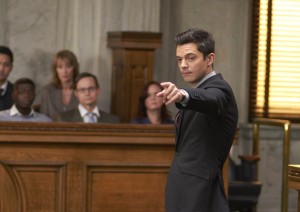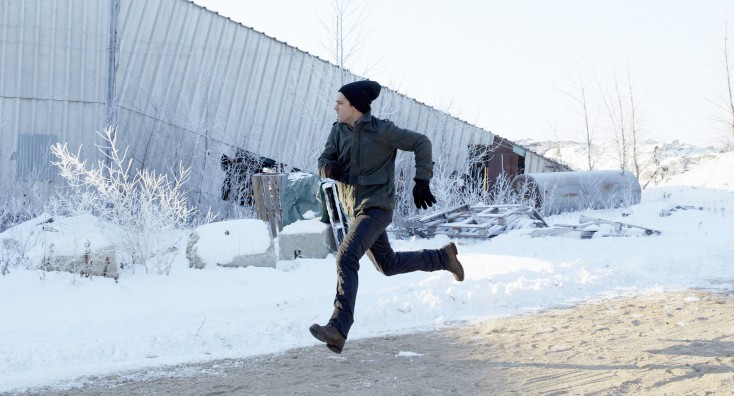
Dominic Cooper stars in “Reasonable Doubt.” ©Lionsgate Entertainment. CR: Allen Fraser.Dominic Cooper stars in “Reasonable Doubt.” ©Lionsgate Entertainment. CR: Allen Fraser.
By ANGELA DAWSON
Front Row Features
HOLLYWOOD—Dominic Cooper has two reasons to celebrate this January. On January 17, his compelling crime drama “Reasonable Doubt,” opens in theaters. Later this month, he depicts James Bond creator Ian Fleming in a four-part miniseries, airing on BBC America.
On a late December day, though, the dashing Brit is simply trying to ward off a cold. An assistant has brought a large glass of orange juice to help in his cause as he sits down for an interview.
The 35-year-old has been a working actor since his teens but American audiences have just gotten to know him over the past few years with his high-profile roles in “Captain America: The First Avenger,” in which he plays the father of Tony Stark (a.k.a. Iron Man), his chilling turn in “Devil’s Double,” in which he played Saddam Hussein’s ruthless son Uday and his double, as well as 2012’s fantasy actioner “Abraham Lincoln: Vampire Hunter.”
In “Reasonable Doubt,” he plays Mitch, an ambitious Chicago lawyer who pulled himself up from his blue-collar bootstraps to become a successful litigator. With a wife and new baby, he seems to have it all. After a night of celebration, he makes the poor choice of getting behind the wheel and hits what appears to be a transient. In a moment of panic, he flees the scene, but not before calling 911 anonymously. Wracked with guilt, he manipulates the case to acquit the accused criminal (played by Samuel L. Jackson), who was found with the body at the scene. Following the trial, Mitch’s worst fears come true when he realizes that his actions have freed a guilty man, and he has to track him down before he kills again.
Cooper says getting the South Chicago accent was a bit tricky but he worked with a dialogue coach to the get the character just right.
Playing the iconic spy/author Fleming was even more daunting, the actor recalls, but also a welcome challenge.
Q: For “Reasonable Doubt,” how tough was it getting the South Chicago accent? And particularly someone pretending to be more upper class than he was?
Cooper: It is terrifying taking that on because you know how specific those accents are really. From where I’m from (London) there are accents that are specific to each section of the city. The location (of the film) kept changing. It was quite late on that it was decided where this piece would be set. And, like you said, he changed his accent to try and fit in more with the world in which he was working.
Q: That feeds the plot too; it’s not just a gimmick.
Cooper: Yeah, because it’s about his background and it certainly influences the decision he makes in that moment of terror. He’s worked hard to get to this point in his life. He’s got a family and, ultimately, he does the wrong thing to protect that family.
Q: What was the attraction to this script?
Cooper: It was very different from anything I’d played before. I was very excited by this genre. You read a script like this and think, “This is really compelling. I’ve always enjoyed watching films like this.” There wasn’t too much given away (upfront) and the morality of the characters was in a very gray area. You could understand what was behind each of the decisions from each of the characters. None of them are truly good and none are truly bad either. You could sort of justify, as we always can any decision we make in our lives all the time. We are confronted with what’s best for ourselves and the people we love. Yes, we are supposed to know what is morally correct and the right one to choose but it’s a simpler thing to say than it is to put into action. Then someone who tries to right that wrong even though in a way it’s too late, he actually tries his hardest to make it better. And then he regrets that. So there’s a lot at stake and to be dealt with as he tries to achieve a lot in a short space of time.
Q: When you attended university, did you consider a career as a lawyer?
Cooper: No! Never ever ever. I look at it now as a very exciting career, and I’m very close to people who do do it in England, but it’s extraordinarily exhausting and stressful. I find just to be surrounded by the people they’re surrounded by—that life and that world—it’s quite bleak. I feel very removed from it, certainly when I see it. To do that, emotionally, and wrestle with one’s conscience about protecting and standing up for someone you know to be a criminal must be an extraordinary thing to have to do. But it’s great that they do it and I completely understand it. England and America have such good (legal) systems in place for it but it must be tough in and amongst it all the time and surrounded by it. It’s a dark world where we can hide ourselves from.
Q: What was it like working with Sam Jackson and going mano-a-mano with him?
Cooper: I admire him hugely. I think he’s terribly diverse. This character particularly needed someone who we watching really believed the vulnerability of this person. And that could immediately be turned on its head and become someone volatile and very very dangerous. And someone whom you believe, emotionally, had been through seeing their family killed in front of his very eyes. So there’s a lot going on there and you can’t think of anyone who could possibly do it better than Sam. He’s just an incredible presence. And, to have that experience on set is amazing as well. So we were lucky to have someone with his capability to be there on a shoot that had to happen very quickly.
Q: You play a new father in this film. How did you like working with a baby?
Cooper: It’s great. That baby was wonderfully behaved. Looking at it now, it was quite hard. I have friends who have recently had children. I wondered, “Are you just in awe of this thing constantly?” I guess you have to get used to the fact there is this new life in your world. So it was quite hard to judge how much, and at the same time it’s impossible to judge when this terrible tragedy has happened at the same as this beautiful birth, that was quite hard to judge.
Q: You had the holding the child down pat.
Cooper: Thank you. I’m good with a baby.
Q: You’ve got the sequel to “Captain America” coming up in April, where you’re coming back as Howard Stark, right? And you’ve got “Fleming: The Man Who Would be Bond” coming up too.
Cooper: Kind of. I can’t say too much about (“Captain America: The Winter Soldier”). The Fleming (miniseries) I just finished is really exciting. I think that’s going to be really good. He had a fascinating life. Very few people know how influential he was in the Second World War in terms of espionage and the creation of the CIA so it’s a really really exciting project. We finished shooting it. It’s not a detailed biographical account of his life. We use moments of it, and manipulated it and tell a story of a man who I think people would have liked to see him as—this sort of James Bond character.
Q: It’s also about the relationship between him and his mistress who became his wife, right?
Cooper: Very much so. It was an extraordinary relationship really. It was a quite volatile and dangerous one.
Q: They were into some kinky stuff.
Cooper: Yeah. They both seemed to be. I’m not sure what the basis of that was but it took a long time for them to give of themselves totally to one another.
Q: Will that air in Great Britain first?
Cooper: No, it’ll come out (in the U.S.) on BBC America before it comes out in the U.K., strangely enough.
Q: Would you like to play a spy again?
Cooper: Yeah. It’s a very very exciting world, because we know it exists. There’s evidence of these people in the Secret Service who go in and achieve these great things, and I’m certainly fascinated by that world.
Q: Could you see yourself as James Bond one day?
Cooper: (He laughs.)





